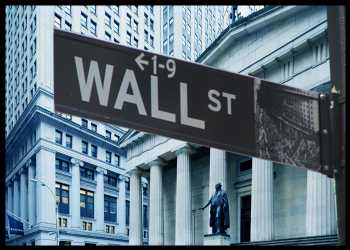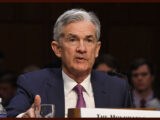
Negative Reaction To Powell Speech Sparks Sell-Off On Wall Street
September 2, 2022With traders reacting negatively to remarks by Federal Reserve Chair Jerome Powell, stocks moved sharply lower during trading on Friday. The major averages more than offset the upward move seen over the two previous sessions, falling to their lowest levels in a month.
The major averages saw further downside going into the close, ending the session at their worst levels of the day. The Dow plunged 1,008.38 points or 3 percent to 32,283.40, the Nasdaq dove 497.56 points or 3.9 percent to 12,141.71 and the S&P 500 plummeted 141.46 points or 3.4 percent to 4,057.66.
With the steep losses on the day, the major averages also moved notably lower for the week. The Nasdaq tumbled by 4.4 percent, while the Dow and the S&P 500 slumped by 4.2 percent and 4.0 percent, respectively.
The sell-off on Wall Street came as Powell’s highly anticipated remarks at the Jackson Hole economic symposium were seen as more hawkish than some had hoped.
In his prepared remarks, Powell acknowledged the central bank’s efforts to combat inflation will cause “some pain” but argued a failure to restore price stability would mean “far greater pain.”
Powell reiterated the Fed’s resolve to bring inflation back to its 2 percent target, declaring that the “economy does not work for anyone” without price stability.
The Fed chief said the central bank would use its tools “forcefully” to bring demand and supply into better balance.
Powell noted lower inflation readings in July are welcome but said the Fed will need to see more than a single month’s improvement before it is confident that inflation is moving down.
Ahead of Powell’s remarks, the Commerce Department released its report on personal income and spending in the month of July, which included a reading on inflation said to be preferred by the Fed.
The report showed the annual rate of core consumer price growth slowed to 4.6 percent in July from 4.8 percent in June. Economists had expected the pace of growth to slow to 4.7 percent.
Including food and energy prices, the annual rate of consumer price growth slowed to 6.3 percent in July from 6.8 percent in June. The slowdown surprised economist, who had expected the pace of growth to accelerate to 7.4 percent.
In July, the Fed decided to raise interest rates by 75 basis points for the second meeting in a row, increasing the target range for the federal funds rate to 2.25 to 2.50 percent.
Powell noted he said at the time that another unusually large rate hike could be appropriate at the next meeting set for September 20-21.
“We are now about halfway through the intermeeting period,” Powell said. “Our decision at the September meeting will depend on the totality of the incoming data and the evolving outlook.”
While Powell said it will likely become appropriate to slow the pace of rate hikes “at some point,” traders may have been hoping for a more definitive declaration.
Sector News
Computer hardware stocks turned in some of the market’s worst performances on the day, resulting in a 6.2 percent nosedive by the NYSE Arca Computer Hardware Index.
PC maker Dell Technologies (DELL) helped lead the sector lower after reporting mixed fiscal second quarter results and warning of slowing sales.
Substantial weakness was also visible among semiconductor stocks, as reflected by the 5.8 percent plunge by the Philadelphia Semiconductor Index.
Gold stocks also showed a significant move to the downside on the day, dragging the NYSE Arca Gold Bugs Index down by 5.8 percent.
The weakness among gold stocks came amid a notable decrease by the price of the precious metal, with gold for December delivery tumbling $21.60 to $1,749.80 an ounce.
Housing, retail, transportation and banking stocks also saw considerable weakness, reflecting a broad based sell-off on Wall Street.
Other Markets
In overseas trading, stock markets across the Asia-Pacific region moved mostly higher during trading on Friday. Japan’s Nikkei 225 Index climbed by 0.6 percent, while Hong Kong’s Hang Seng Index jumped by 1.0 percent.
Meanwhile, the major European markets showed notable moves to the downside on the day. While the German DAX Index plunged by 2.3 percent, the French CAC 40 Index slumped by 1.7 percent and the U.K.’s FTSE 100 Index fell by 0.7 percent.
In the bond market, treasuries saw substantial over the course of the session before closing little changed. Subsequently, the yield on the benchmark ten-year note, which moves opposite of its price, inched up by less than a basis point to 3.035 percent.
Looking Ahead
The monthly jobs report is likely to be in the spotlight next week, overshadowing reports on consumer confidence, manufacturing activity and factory orders.
Source: Read Full Article


